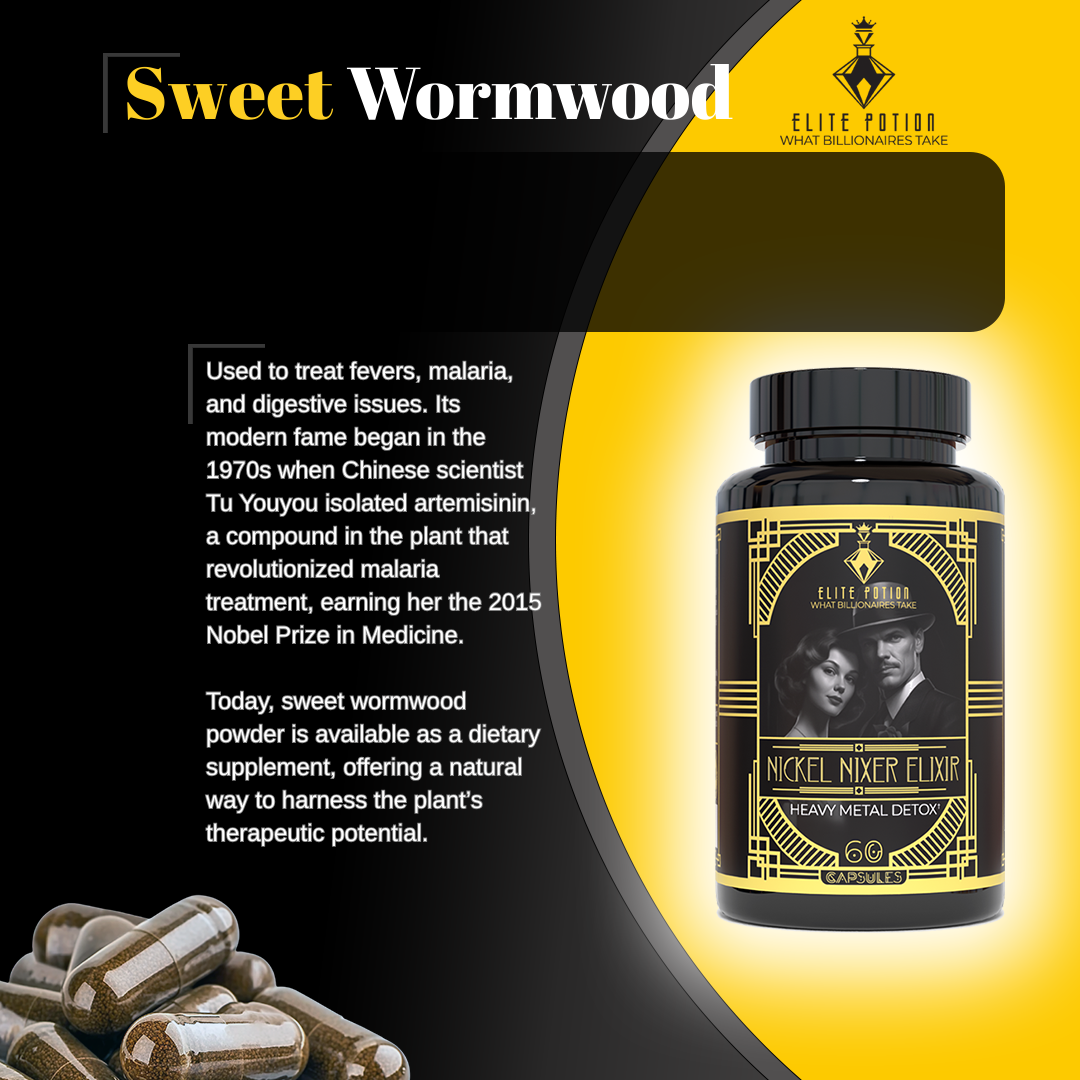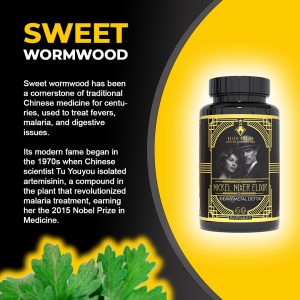
No products in the cart.


A Natural Ally Against Parasites and More
Sweet wormwood (Artemisia annua), also known as sweet Annie or Qinghao in traditional Chinese medicine, is a powerful herb with a rich history of medicinal use spanning over 2,000 years. Renowned for its potent bioactive compounds, particularly artemisinin, sweet wormwood has gained attention in modern times for its antiparasitic, anti-inflammatory, and potential anticancer properties. In this blog post, we’ll explore the health benefits of sweet wormwood powder, with a focus on its role in combating parasites, supporting overall health, and serving as a natural alternative to pharmaceutical interventions.
A Brief History of Sweet Wormwood
…used to treat fevers, malaria, and digestive issues. Its modern fame began in the 1970s when Chinese scientist Tu Youyou isolated artemisinin, a compound in the plant that revolutionized malaria treatment, earning her the 2015 Nobel Prize in Medicine. Today, sweet wormwood powder is available as a dietary supplement, offering a natural way to harness the plant’s therapeutic potential.
1. Potent Antiparasitic Properties
One of the most well-documented benefits of sweet wormwood is its ability to combat parasitic infections. The active compound artemisinin and its derivatives are highly effective against a range of parasites, including:
Malaria: Artemisinin is a cornerstone of artemisinin-based combination therapies (ACTs), the World Health Organization’s recommended treatment for uncomplicated malaria. It works by targeting malaria parasites (Plasmodium species) in the blood, causing rapid parasite clearance. Clinical trials have shown that sweet wormwood tea or dried leaf tablets can clear malaria parasitemia in as little as 2–4 days.
Schistosomiasis: This neglected tropical disease, caused by flatworms, affects over 200 million people annually. A 2018 clinical trial in the Democratic Republic of Congo found that sweet wormwood tea cleared schistosomiasis parasites in 14 days—faster than the standard drug praziquantel (21 days)—with fewer side effects.
Other Parasites: Sweet wormwood has shown activity against protozoan parasites like Leishmania, Trypanosoma, and Giardia, as well as metazoan parasites like Schistosoma. Its broad-spectrum antiparasitic effects make it a valuable tool for addressing parasitic infections, particularly in regions where drug resistance is a growing concern.
The mechanism behind these effects involves artemisinin’s endoperoxide bridge, which generates free radicals that damage parasite membranes and proteins, effectively killing them. Unlike some pharmaceutical antiparasitic drugs, sweet wormwood’s natural compounds may offer a gentler approach, with studies reporting minimal side effects when used appropriately.
Sweet wormwood’s bitter compounds stimulate the production of digestive enzymes and bile, promoting healthy digestion. Traditionally, it has been used to alleviate symptoms of indigestion, bloating, and nausea. Its antimicrobial properties may also help balance gut flora by targeting harmful bacteria and parasites, potentially benefiting conditions like small intestinal bacterial overgrowth (SIBO).
For those dealing with parasitic infections of the gut, such as pinworms or roundworms, sweet wormwood powder can be taken as a tea or capsule to support the body’s natural defenses. Anecdotal reports and some animal studies suggest it may help flush out intestinal parasites, though human studies are limited.
3. Anti-Inflammatory and Antioxidant Effects
Sweet wormwood contains flavonoids and other antioxidants, such as chamazulene, which combat oxidative stress and inflammation. These properties may support overall wellness by reducing the risk of chronic diseases linked to inflammation, such as heart disease and cancer. Preliminary studies also suggest that sweet wormwood may help manage inflammatory conditions like rheumatoid arthritis and Crohn’s disease, offering a natural alternative to anti-inflammatory drugs.
4. Potential Anticancer Properties
Emerging research highlights sweet wormwood’s potential in oncology. Artemisinin has shown potent anticancer effects in cell lines and animal models by inducing apoptosis (cell death) in cancer cells and inhibiting tumor growth. A clinical trial in lung cancer patients reported benefits from short-term artemisinin use, and case reports suggest activity against diverse cancers. While more research is needed, these findings position sweet wormwood as a promising complementary therapy, potentially reducing reliance on harsh chemotherapeutic agents.
5. Immune System Support
Sweet wormwood’s ability to stimulate macrophages, a type of immune cell, enhances the body’s response to infections. This immune-boosting effect, combined with its antimicrobial and antiviral properties, makes it a versatile herb for supporting overall health, particularly during cold and flu season or in the presence of chronic infections.
Pharmaceutical antiparasitic drugs like praziquantel, albendazole, and artemisinin-based combination therapies are effective but come with challenges:
Side Effects: Drugs like praziquantel can cause headaches, nausea, fatigue, and abdominal pain. In contrast, sweet wormwood tea and supplements have been reported to have fewer side effects in clinical trials.
Drug Resistance: Parasites like Hymenolepis nana (a common tapeworm) and Plasmodium species are becoming resistant to drugs such as praziquantel and artemisinin derivatives. Sweet wormwood’s complex mix of bioactive compounds may offer a synergistic effect, potentially reducing the risk of resistance.
Accessibility and Cost: In resource-limited settings, pharmaceutical drugs may be expensive or unavailable. Sweet wormwood, which grows readily in tropical climates, can be cultivated locally and processed into teas or powders, making it a cost-effective and sustainable option.
However, sweet wormwood is not without limitations. The World Health Organization cautions against using herbal Artemisia preparations for malaria due to variable artemisinin content and the risk of relapse if doses are insufficient. Additionally, sweet wormwood should not be used during pregnancy due to potential embryo-fetal toxicity, and high doses may cause liver toxicity in rare cases. Always consult a healthcare provider before using sweet wormwood, especially if you’re taking medications or have underlying health conditions.
Sweet wormwood powder is a versatile and potent natural remedy with a strong track record in fighting parasites, supporting digestion, and promoting overall health. Its active compounds, particularly artemisinin, offer a compelling alternative to pharmaceutical antiparasitic drugs, with fewer side effects and potential benefits for inflammatory and immune-related conditions. While more human studies are needed to confirm its efficacy for non-malarial uses, sweet wormwood’s long history and emerging research make it a valuable addition to a holistic health regimen.
If you’re considering sweet wormwood for parasite cleansing or other health goals, consult a healthcare provider to ensure safe and effective use. By combining the wisdom of traditional medicine with modern science, sweet wormwood powder can be a powerful ally in your journey toward healing and wellness.
Disclaimer: This blog post is for informational purposes only and does not constitute medical advice. Always consult a qualified healthcare professional before starting any new supplement or treatment.
Verywell Health: Wormwood Benefits, Dosage, Side Effects
Medical News Today: Wormwood Uses, Benefits, and Risks
Healthline: Wormwood Benefits, Dosage, and Side Effects
NPR: Wormwood Tea Study for Schistosomiasis
PMC: Artemisinins in Medicine
Examine.com: Artemisia annua Benefits and Side Effects
ScienceDirect: Artemisia annua Overview
Gaia Herbs: Sweet Wormwood Benefits
Zuma Nutrition: Wormwood Benefits
WPI: Wormwood Tea for Schistosomiasis
PMC: Artemisia annua in Traditional Medicine
-,,, X Posts on Wormwood Benefits
These statements have not been evaluated by the Food and Drug Administration. This product is not intended to diagnose, treat, cure, or prevent any disease.
Copyright © 2026, Elite Potion
Leave a comment